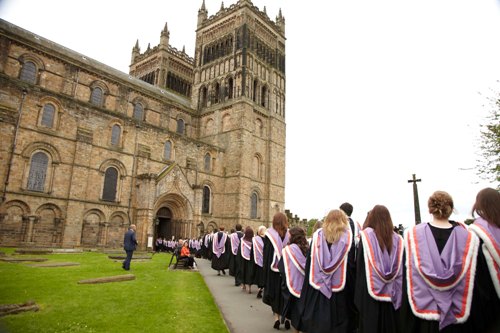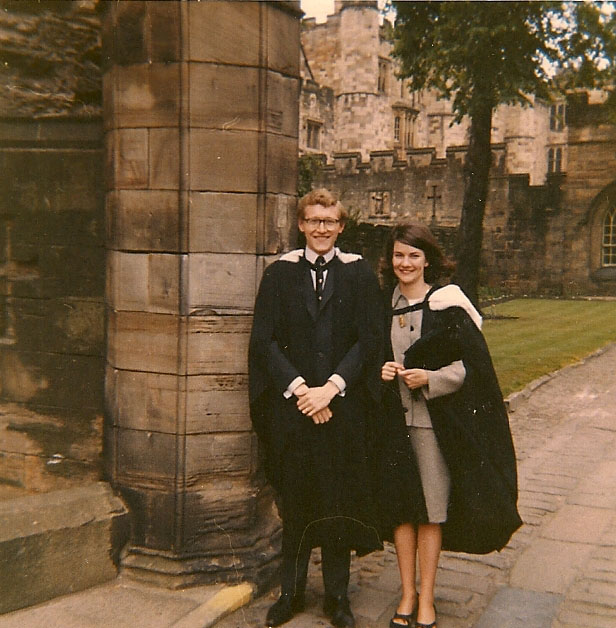It's Winter Congregation next week and, for the first time ever, graduating students will be joined by representatives of the Class of 1966, a group of Durham alumni who left 50 years ago.

Students will celebrate their graduation with the traditional procession from Durham Castle to the Cathedral where they are awarded their degrees by the University’s Chancellor and world-renowned opera singer, Sir Thomas Allen.
This alumni of the Class of 1966 are coming back to the University to celebrate the golden anniversary of their graduation. In the first event of its kind at Durham, they will be welcomed by the University community and process down the aisle, before enjoying the post-ceremony celebrations.
A few such alumni share their stories here:
 Alistair Gibb (Social Studies, University College, 1962-66):
Alistair Gibb (Social Studies, University College, 1962-66):
After staying on at Durham to watch the World Cup in 1966, I went to Strathclyde and did a postgrad business diploma (later the Strathclyde MBA) and went into investment banking with what became the 3i Group. After 16 years with them I was Finance Director to a construction group then went in to education and helped to develop Scotland's first undergraduate degree in Entrepreneurship and Business Development at Abertay University. After a spell in Economic Development I am now (yes, still working!) a self-employed corporate finance consultant working mainly with Scottish Enterprise and I chair the organisation which looks after the Church of Scotland's funds. I am also a Trustee of University College Durham Trust. Along the way I founded a fast food business in Edinburgh in 1974 and dealt in financial history books for 30 years.
 Eileen Ward (nee Hughes) (Geography, St Mary’s College, 1962-65):
Eileen Ward (nee Hughes) (Geography, St Mary’s College, 1962-65):
I graduated in in 1965, intending to teach on a VSO scheme in Zambia. I married Kenneth E. Ward, a history graduate from Grey College, that summer. This scheme involved a Dip. Ed. in Salisbury, Southern Rhodesia, but UDI intervened and we returned to Durham. Ken was offered the opportunity to start a PhD under William Wallace, and I did a Dip. Ed. I worked in primary and secondary schools in Durham. The next year I taught at my husband's primary school in Essex while he was working in the Foreign Office archives in London.
We then went to Bonn for Ken to work in the German archives there, as it was then the German capital. When we returned to Durham, William Wallace was offered the first history chair at the New University of Ulster. So we moved to Coleraine with Raymond Pearson of Castle and Margaret (nee Fogg) of St. Mary's. Other Durham graduates - Rev. John Bach (who became a university chaplain who is still here) Mick Lemon from Cuthbert’s and his wife Leo from Aidan's, also came as did the librarians Benedict Benedikz, his wife Phyllis and Pam Compton (who is still here in Portstewart).
We have been in Northern Ireland nearly 50 years. Our older son, an Oxford German PhD met his wife Janet from Scotland (German & Sociology) when they were both teaching at Aberdeen University. Two years ago Janet (Stewart) was appointed Professor of Visual Culture in Durham and Simon is a Senior Lecturer, both in Modern Languages. Our younger son, Francis, after his history degree and Dip. Ed. in Durham, has been teaching in Framwellgate School and lives with his wife (from Northern Ireland) and two boys in Chester-le-Street. Our only other claim to fame was 30 years ago, when we were the last family to win Robert Robinson's TV quiz Ask the Family.
Why did I come to Durham? I went to an excellent Church of England Grammar School in Bolton, where my geography teacher had been taught at Manchester University by W.B. Fisher, who became Professor of Geography in Durham. I won a scholarship and was the first woman President of the Geographical Society.
In Northern Ireland, which has a surplus of primary teachers, I moved into Further Education for more than 30 happy years. Professor Fisher also initiated my interest in wine with dinners for visiting speakers and our field trip to Bagni di Lucca. We have been back several times, as a professor here has run conferences with Pisa University, about the many literary figures who lived there, including an Anglo-Irish doctor and prolific novelist, Charles Lever from Portstewart, a contemporary of the Trollopes who were also there. Our first field trip was to Ballycastle in Northern Ireland with Bruce Proudfoot, whose brother was at QUB - yet another Northern Ireland connection. I studied part time for a Diploma in Wine from the Wine and Spirit Education Trust lectured and wrote for local papers and am still involved with the University Wine Club and help run a U3A wine club here SWIG (Senior Wine Imbibers Group).
Edwin W Swatman (History, University College, 1963-66):
Thoughts on Half a Century Ago: A Durham Reflection
It was not love of irony or all-too-evident lack of great distinction as a historian that caused me to join the company founded by the man who described my subject as “more or less bunk”; that decision can be traced back to a casual glance at a notice in the University Appointments Board temptingly inviting undergraduates to enjoy the lavish hospitality of the Ford Motor Company Recruitment Department at a three day introduction ‘course’. My eager application to join in the fun on this all-expenses-paid jolly was submitted too late, but did result in retaining contact with Ford, the impressively professional organisation that gave me my first job as a graduate trainee and set me off on my working life in the motor industry (albeit eventually spent with other companies) – a fulfilling career that I would never have foreseen.
In the initial years I lamented that I had not undertaken specifically vocational studies to acquire skills and knowledge with direct relevance to industry and commerce. I was not entirely convinced by the reassurances that this deficiency did not matter as my exposure to demanding academic discipline at Durham would always serve me well, and not only as I gained experience. In time I changed my mind: unprecedented situations and problems arose for which no text books could be written and there were no ready-made solutions, even from the most illustrious of business schools (for which, none the less, I came to have much respect).
Years studying history at Durham (and, indeed, at my grammar school), admittedly heavily reliant on the advantage of abundant written sources, prepared me for tackling issues about which I knew absolutely nothing – a need that seemed to increase with growing responsibility in my business life.
My education was not completed on graduation from Durham; but those university years did enable me to derive great benefit from working alongside experienced and talented colleagues, and the learning that then truly began.
For more information on Congregation, visit: www.durham.ac.uk/ceremonies/congregation/